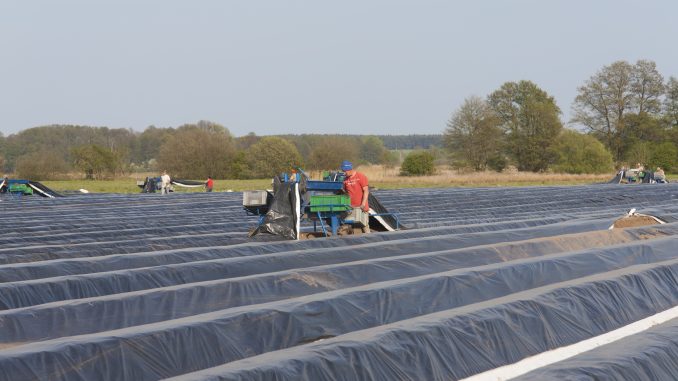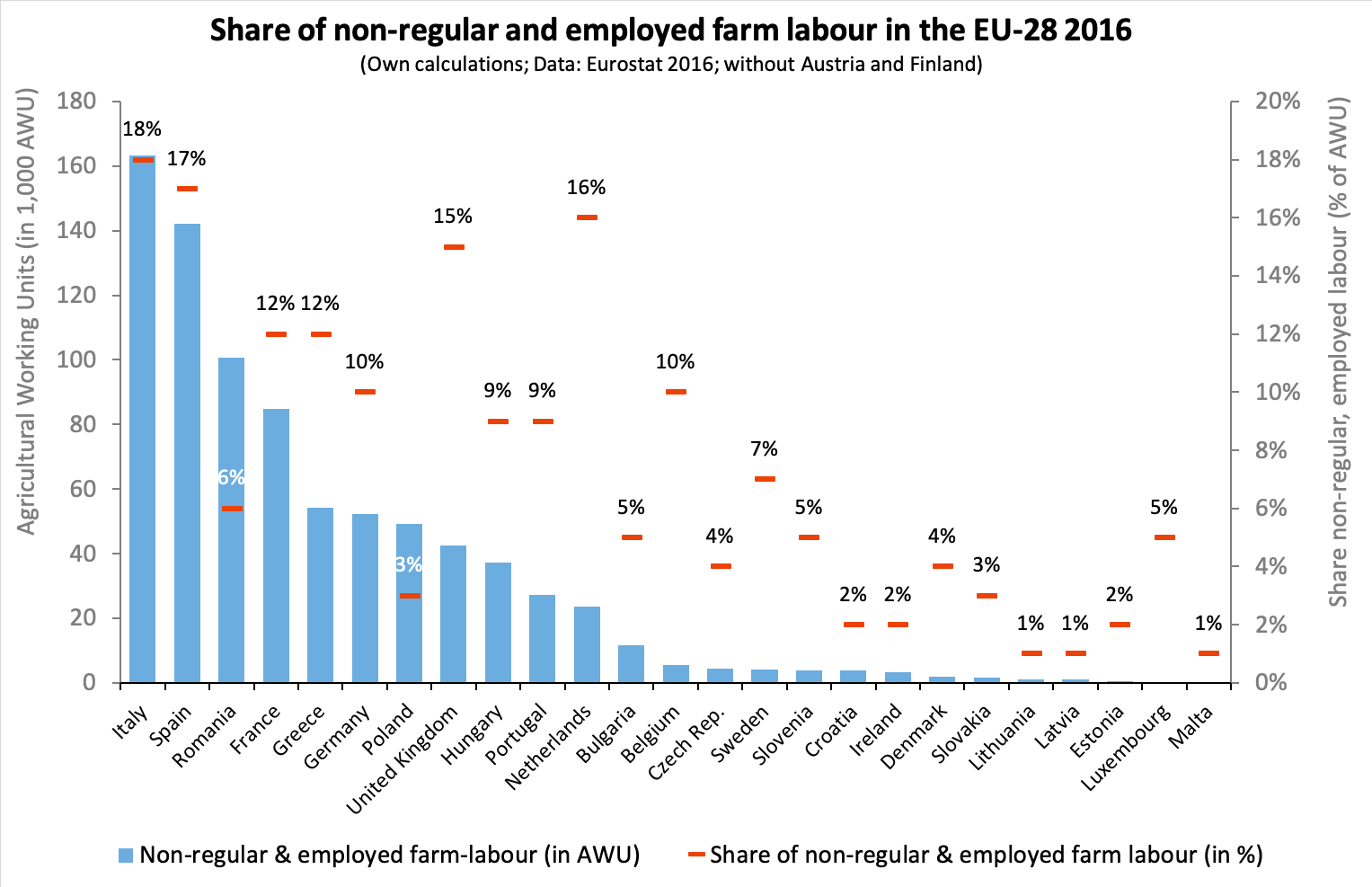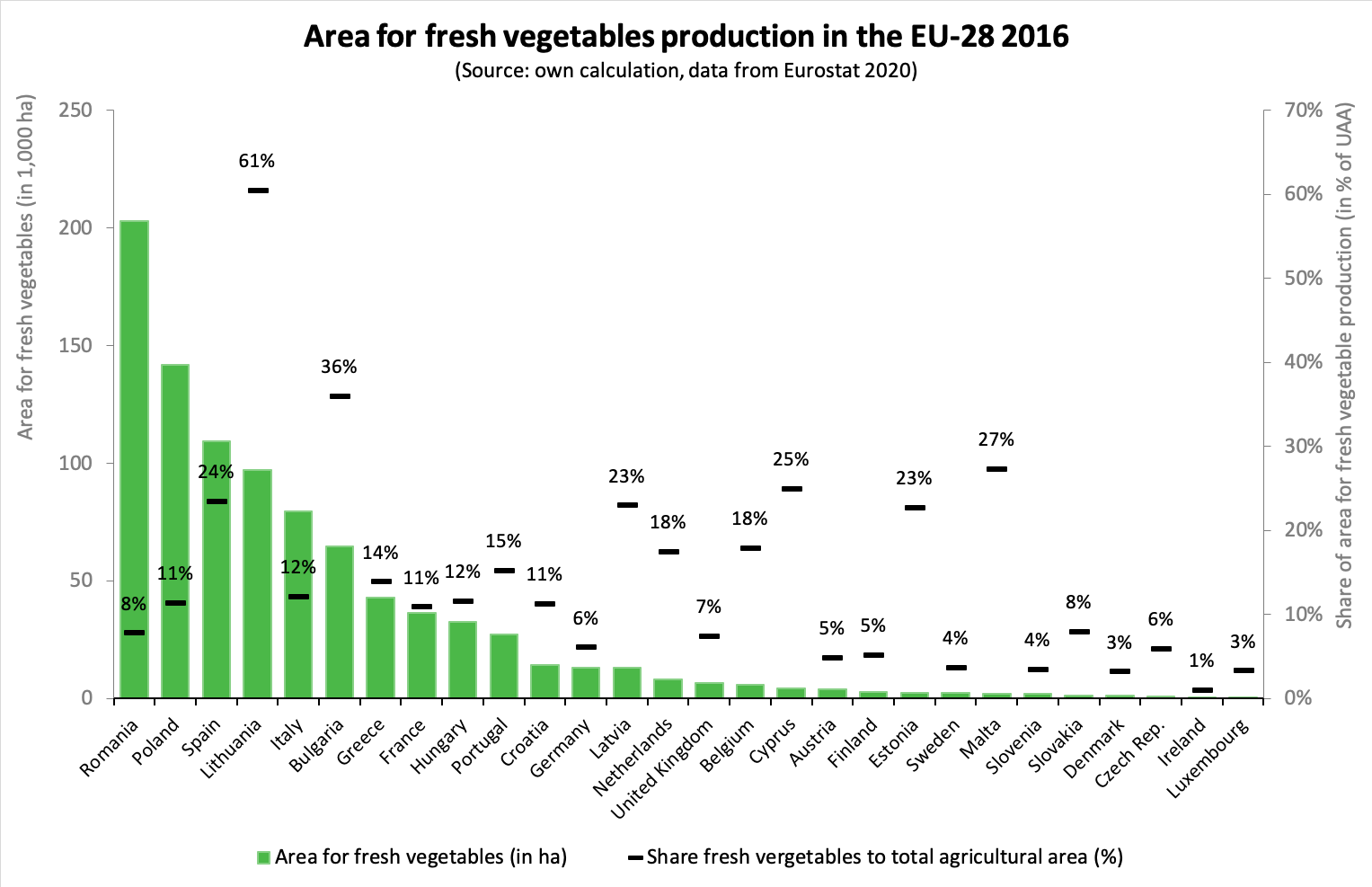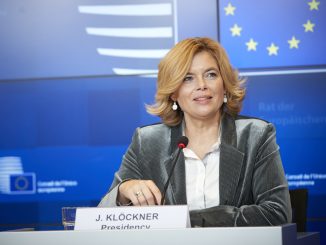
In part 1 of his review of the available data, Sebastian Lakner found that despite the challenges of the coronavirus crisis, we have little reason to worry about food supply in the EU. Agricultural production is on track for this year, and the EU is self-sufficient in most areas. But his findings come with some major caveats. Trade in commodities must continue to flow to guarantee food supply in the context of the EU’s interconnected agribusiness model. Here in part 2, Sebastian Lakner examines another critical factor: labour and seasonal migrant workers.
The main challenge is seasonal workers
The main challenge for the coming months could be travel restrictions for seasonal workers within the EU. Starting with the German situation, we know from practice that many seasonal workers are coming from Eastern Europe (Romania, Poland, Bulgaria); however, there are no precise statistics on this topic. The role of seasonal workers is even more pronounced in other EU countries. The following figure based on Eurostat data shows the share of non-regular and employed labour forces, capturing also seasonal workers from other countries:
First, the figure shows that non-regular labour plays an important role especially in Italy, Spain, Romania, France and Greece. These countries are the main producers of vegetables, fruits, wine and permanent crops, where this type of labour is needed. And especially in Italy and Spain, the share of non-regular and employed labour is high, with almost 20% of labour units. The calculated EU average (excluding Austria and Finland) is 9.0%. Labour units in this case are a standard unit which assumes a certain number of hours per day, so it may be that this type of labour is underestimated (which is a systematic problem for this type of estimation).
Within agriculture, there are some production systems which are highly dependent on seasonal workers. Production of vegetables, fruits, wine and permanent crops requires labour which is not only related to harvesting. Especially in vegetable production, the need for seasonal labour starts with the planting process and continues throughout the season. Over the coming months, production in these sectors can expect to experience difficulties. In Italy, Spain and France, the outdoor growing season in fresh vegetable production has already started; in Germany we start in March/April. The following figure shows that especially in some countries, the share of area for fresh vegetable production is comparatively high:
The southern EU countries and interestingly Lithuania are the main producers of fresh vegetables. In these countries we may expect problems due to shortages in seasonal labour. This is especially important since southern EU countries normally deliver to other EU regions. If for example harvests for some vegetables are low, they are normally replaced by production from France, Spain, Italy or Romania. This may be a challenge this year, since Italy and Spain are substantially affected by Covid-19 and production may become much more difficult than for example in other regions where the infection rate is still lower. But again we will see how this develops in the coming weeks.
Help wanted
In March, during the first weeks of the coronavirus crisis with the shutdown of public life in many EU countries and the closure of borders, many farms and enterprises were quick to react and have been actively searching for labour. In Germany, for instance, many farms are publicly appealing for labour. There are platforms where farms can request labour and interested persons can offer their time. The German association of agricultural machinery services (Deutscher Maschinenring e.V.) has a large platform supported by the German Ministry for Food and Agriculture (BMEL), called “Das Land hilft” (in German). There are other local or more specific initiatives as well, like “Wir haben es satt”, providing an overview of different platforms (in German). The German federal government is openly supporting this search (see press release). And, in some cases, students and members of Fridays for Future are helping, for example in Hessen and Bavaria (links in German).
On April 2, 2020 the German Ministry for Food and Agriculture (BMEL) announced a travel strategy to overcome the labour shortage. The ministry proposed a set of rules to allow about 40,000 seasonal workers to travel by plane to Germany in April and again in May, which could cover a substantial part of the 100,000 workers needed in May. The concept paper includes strict rules for accommodation and health checks before entering Germany. Implicit quarantine is another measure proposed: seasonal workers can start work on a farm but must remain confined to the respective farm location and keep out of contact with other workers. The paper is a step in the right direction, but is potentially quite restrictive. Although these rules seem necessary from a health perspective, it is still unclear to what extent seasonal workers from previous years will avail of the opportunity.

Farms are actively searching via different channels and social media, since there is a lot at stake. Still, there remains the question of whether this is sufficient to replace up to 9% of the EU workforce. Quantitatively, we need to observe whether persons working for the first time in agriculture are able to do the work in the longer term. Farm work can be tough and exhausting, and requires knowledge and manual skills. Labourers may have to move to the countryside from cities, which might also be a challenge. There will need to be some degree of hands-on training over the coming weeks. It remains to be seen whether these solutions will be satisfactory on the farms, and whether we can tap into a new workforce for agriculture.
Tentative assumptions
A conclusion is difficult at this early stage, since a lot depends first of all on how severely Covid-19 will affect people and therefore infrastructure. In part 1 we noted that trade of agricultural commodities is key for food supply for the EU’s interconnected farm business model. We can also make the following tentative assumptions:
1) Seasonal workers are an important factor in agricultural production. For many years, the role of hired workers has been underestimated and their social situation has been ignored. So for instance, the introduction of a minimum wage has been postponed in Germany for some years, at the expense of hired farm workers. In the longer term, this crisis will hopefully lead to better labour relations in agriculture, at least on those farms which until now have ignored the necessity of sustainable labour relations.
2) The free movement of labour within the European Union has increased well-being in many parts of European agriculture. Agriculture is a sector which is specifically dependent on seasonal labour, so the EU model is a useful model. This could be observed for example after the Brexit referendum, where farmers were the first to complain about a shortage of labour from outside the UK. The European Commission is now recommending that member states identify singular solutions for seasonal workforces, and allow them free movement even in the coronavirus crisis – of course taking into account rules to prevent workers from getting infected. In a press statement on March 30, 2020, the Commission said: “In such a situation, Member States should treat those persons as critical workers and communicate to the employers the necessity to provide for adequate health and safety protection.” It will be up to the member states to support this initiative which is vital for some areas of agriculture. It remains to be seen whether the EU will be able to find solutions.
3) Established good labour relations will pay off during the crisis. If farms have invested into good relationships with their hired labourers and other contractors, this will help them to maintain production and deliver their goods during the crisis. This is true for traders and processors, but also for farm enterprises. It is good business to make sure hired workers have access to good accommodation and food, sound hands-on training, a good working climate and finally, decent pay. These will all be necessary ingredients if some of the missing seasonal workers from Eastern Europe are to be replaced with local workers. If exhausting work is acceptable in the medium term, these local workers may choose to stay on a farm, as long as these criteria are met. Farmers are very active at the moment, so I would be moderately optimistic that good agricultural entrepreneurs can and will solve these issues.
4) The coronavirus crisis does not suggest any step backwards in EU agricultural policy for example to a focus on production only. Some political actors are seemingly tempted to suggest that all farm production is scarce – as a reason to postpone or abolish any environmental requirements and safeguards. The EPP is calling for environmental safeguards to be postponed because “we are facing the biggest crisis that the agricultural sector has seen in decades.”
To my understanding, this statement is misleading the public. In part 1 of this article I developed some statistical arguments as to why the coronavirus crisis is not an agricultural crisis per se. Indeed agriculture is less affected than other sectors where production and services are completely shut down. Of course, productive agriculture has its merits, leading to a high degree of self-sufficiency as I described in part 1, which will surely help to supply the EU with agricultural commodities. We need productive agriculture, but it must take into account environmental concerns, and solve problems such as biodiversity decline, increased greenhouse gas emissions from agriculture, and the nutrient overflow in some European regions. This has not changed in recent weeks.
Much will depend on whether the next CAP reform post 2020 can strike a better balance between production and environmental concerns. The tendency has been to continue with business as usual under CAP, which has been criticised by 3,600 scientists. At this moment in time we need a sustainable production model and there is no justification whatsoever for abolishing environmental safeguards.
Agricultural production is running at normal scale. The main tasks for the coming weeks will be to reorganize the labour market and to facilitate trade within the EU and on the international stage, for example in fertilizer and fodder. The abolishment of environmental rules will not help at all. There are challenges ahead which can be solved by the EU Commission and the member states. Responsible policy should focus on strategies to restrict the spread of the coronavirus, and to allow for free trade and some degree of workforce mobility – not only for the farming sector.
A version of this article was originally published in German on Sebastian Lakner’s blog.
More on Covid-19 and Food Supply
Effects of Coronavirus on Agricultural Production – a First Approximation
Framing Farming – Nationalism, Food Security and Food Sovereignty
UK | Coronavirus: Rationing Based on Health, Equity and Decency now Needed
UK | Coronavirus Diary: the Virus That Did a No-Deal Brexit on our Food Supply
Coping with Covid19 – Commoning as a Pandemic Survival Strategy
Council of Ag Ministers meet on Covid19 | Green Lines, State Aid, CAP Extension
Coping with Covid19 – Tensions in Farming, Trade and the EU Institutions
Coping with Covid19 – the Open Food Network and the New Digital Order(s)









2 Trackbacks / Pingbacks
Comments are closed.